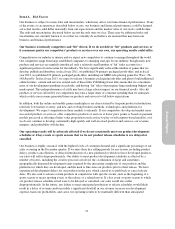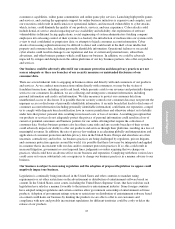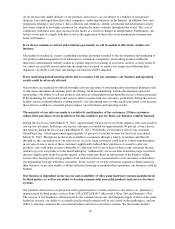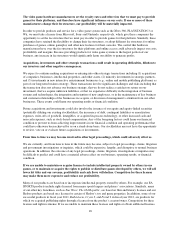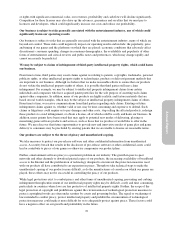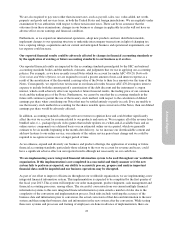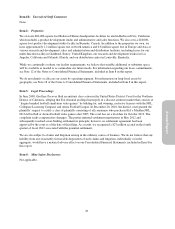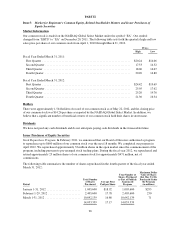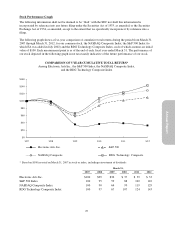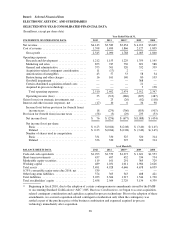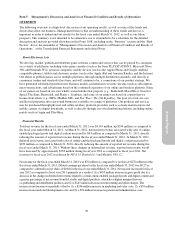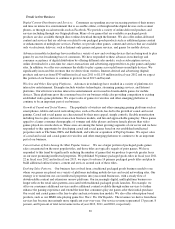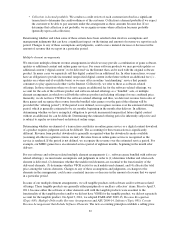Electronic Arts 2012 Annual Report Download - page 107
Download and view the complete annual report
Please find page 107 of the 2012 Electronic Arts annual report below. You can navigate through the pages in the report by either clicking on the pages listed below, or by using the keyword search tool below to find specific information within the annual report.
Annual Report
We are also required to pay taxes other than income taxes, such as payroll, sales, use, value-added, net worth,
property and goods and services taxes, in both the United States and foreign jurisdictions. We are regularly under
examination by tax authorities with respect to these non-income taxes. There can be no assurance that the
outcomes from these examinations, changes in our business or changes in applicable tax rules will not have an
adverse effect on our earnings and financial condition.
Furthermore, as we expand our international operations, adopt new products and new distribution models,
implement changes to our operating structure or undertake intercompany transactions in light of changing tax
laws, expiring rulings, acquisitions and our current and anticipated business and operational requirements, our
tax expense could increase.
Our reported financial results could be adversely affected by changes in financial accounting standards or
by the application of existing or future accounting standards to our business as it evolves.
Our reported financial results are impacted by the accounting standards promulgated by the SEC and national
accounting standards bodies and the methods, estimates, and judgments that we use in applying our accounting
policies. For example, as we have recently issued Notes which we account for under ASC 470-20, Debt with
Conversion and Other Options, we are required to record a greater amount of non-cash interest expense as a
result of the amortization of the discounted carrying value of the Notes to their face amount over the term of the
Notes. Consequently, we report lower net income in our financial results because ASC 470-20 requires interest
expense to include both the current period’s amortization of the debt discount and the instrument’s coupon
interest, which could adversely affect our reported or future financial results, the trading price of our common
stock and the trading price of the Notes. Furthermore, we cannot be sure that the accounting standards in the
future will continue to permit the use of the treasury stock method, with respect to the calculation of diluted
earnings per share when considering our Notes that may be settled entirely or partly in cash. If we are unable to
use the treasury stock method in accounting for the shares issuable upon conversion of the Notes, then our diluted
earnings per share would be adversely affected.
In addition, accounting standards affecting software revenue recognition have and could further significantly
affect the way we account for revenue related to our products and services. We recognize all of the revenue from
bundled sales (i.e., packaged goods video games that include updates on a when-and-if-available basis and an
online service component) on a deferred basis over an estimated online service period, which we generally
estimate to be six months beginning in the month after delivery. As we increase our downloadable content and
add new features to our online service, our estimate of the online service period may change and we could be
required to recognize revenue over a longer period of time.
As we enhance, expand and diversify our business and product offerings, the application of existing or future
financial accounting standards, particularly those relating to the way we account for revenue and taxes, could
have a significant adverse effect on our reported results although not necessarily on our cash flows.
We are implementing a new integrated financial information system to be used throughout our worldwide
organization. If this implementation is not completed in a successful and timely manner or if the new
system fails to perform as expected, our ability to accurately process, prepare and analyze important
financial data could be impeded and our business operations may be disrupted.
As part of our effort to improve efficiencies throughout our worldwide organization, we are implementing a new
integrated financial information system. This implementation is expected to be completed by the first quarter of
the fiscal year 2013. This system will integrate our order management, product shipment, cash management and
financial accounting processes, among others. The successful conversion from our current multiple financial
information systems to this new integrated financial information system entails a number of risks due to the
complexity of the conversion and implementation process. Such risks include verifying the accuracy of the
business data and information prior to conversion, the actual conversion of that data and information to the new
system and then using that business data and information in the new system after the conversion. While testing
these new systems and processes and training of employees are done in advance of implementation, there are
23


